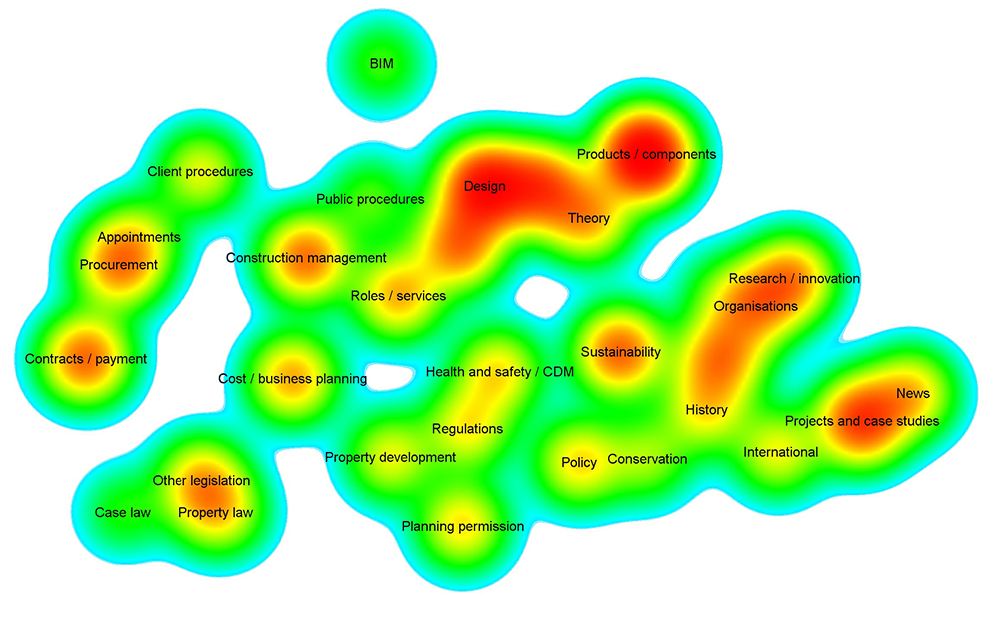An unprecedented study of 6 million pieces of data claims to show that the knowledge framework underpinning UK construction is not fit for purpose.
As the industry reels from the deadly Grenfell Tower fire, the study’s authors warn that practitioners do not have ready access to critical knowledge and that more mistakes are “inevitable”.
Designing Buildings Wiki, an open knowledge base, says it has undertaken the first comprehensive mapping of construction industry knowledge.
It published what it calls the “startling results” in a report this week, which found that:
- Too much essential knowledge is difficult to understand, buried in long documents or locked behind pay walls and will not be used.
- Practitioners need accessible, practical, easy-to-use guidance to help them carry out everyday activities.
- The industry lacks the strategic leadership needed to coordinate the creation and dissemination of knowledge.
- The internet has fundamentally changed the way practitioners access knowledge, but the industry has not kept up.
- BIM remains a specialist subject, disconnected from other industry knowledge.
The report includes visual maps that Designing Buildings Wiki says give “never-before-seen insights into how construction knowledge works and where it fails”.

Visual maps give insights into how construction knowledge works and where it fails (Designing Buildings Wiki)
“In the wake of the Edinburgh schools defects and the fallout from the Grenfell Tower tragedy, the report suggests the industry needs to get organised and stop leaving the dissemination of knowledge to chance – or more mistakes will be made,” the organisation said.
Its chairman, David Trench said: “A lot of construction knowledge published at the moment is niche research aimed at making the top performing 1% of the industry better. But it is leaving the other 99% to fend for themselves. It is well established that construction performance in the UK lags behind other industries and other countries, this report gives some clues about why this is and what could be done to turn things around.”
Mark Farmer, CEO of Cast Consultancy and author of ‘Modernise or Die’ said: “Knowledge and data silos are a feature of our industry and we clearly need to break these open through more collaborative forums and platforms that have greater reach into the mainstream of our industry.”
The report, Fit for purpose? Big data reveals the construction knowledge gap, is available here.
Designing Buildings Wiki was created in 2012 by architect Dr Gregor Harvie and project manager David Trench to make cross-discipline construction knowledge available to everyone for free.
It now includes more than 5,000 articles and is used by 3.5 million people a year, making it one of the most popular construction industry websites.
Photograph: Grenfell Tower, London in the days following the deadly fire (ChiralJon/Wikimedia Commons)
Comments
Comments are closed.







What the construction industry needs is a proper auditing system at least for Govt.funded projects. The industry is in a state, where a building has to collapse with loss of lives and injuries for the Govt.to tighten the laws of design as it happened in Singapore or a bridge has to collapse to prosecute for bribery as it happened in China or whistle blower has to write a 15 page letter to World Bank to audit the Road mess as it happened in Uganda. The worst of all, thousands of people where killed owing to the collapse of buildings during the recent earth quake in Haiti, where as there was no casualty in New Zealand with earthquake of the same magnitude. When there is a proper construction auditing mechanism, which is done by construction professionals, then there is a possibility for standards and evolution of the same with their union. Until then, we have to face all these in addition to the world record loss owing to frauds in audited Govt. funded constructions, which has reached upwards of US$4 trillion a year in 2008 and continuing.
Regards.
A.L.M.Ameer
It’s like trying to turn a Supertanker it will take time .
I remember the days before onsite computers now its second nature when setting up your site along with the kettle the computers arrive.
Servers were tennis players.
In time we will all be using BIM as a matter of fact, my old company Turner Construction now has a fully designated BIM tech department assigned at Pre Construction stage to Commissioning.
I have faith in the industry we will get there.
Regards
Glenn Collins FCIOB.
I am surprised at the findings of this report, because there is a vast amount of information on steel construction freely available at http://www.steelconstruction.info. Described as the free encyclopaedia for
the UK steel construction sector, it was designed to be easy to use, as comprehensive as possible, and the one-stop-shop for technical guidance on steel construction. It brought together all relevant information from BCSA, SCI and Tata Steel (now British Steel), and has been regularly updated since it was created in 2012.
Practical applied knowledge has to be implemented rather than going ahead with the theoretical procedures implementation.
For example, UK believes in the Honours Degrees rather than other professional degrees with practical hands on experience.
Hence, due consideration is to be given “More proactive Practical Approach”.
Studies on practical observations and improvements has to be given priority.
in other words, Thinking outside the box has to be considered.
It has long been evident in the UK that process has been given priority over product knowledge. This was evident in the Edinburgh Schools fiasco and has been reinforced by the Grenfell disaster. European companies involved in construction appear to better trained in product than similar companies in the UK.